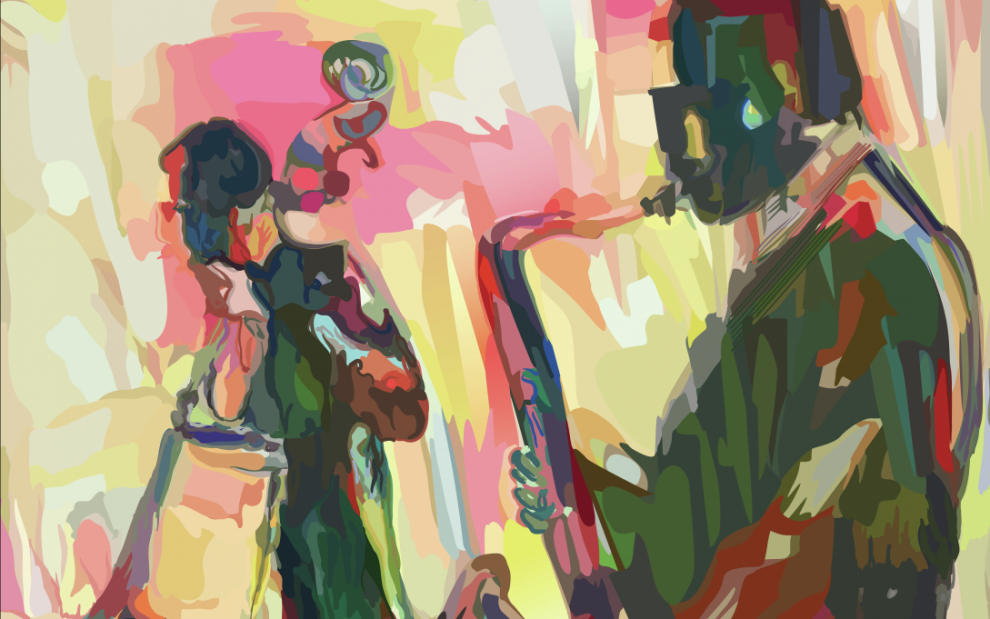Many mornings, before my family gets up, I walk out of the bedroom, go outside, kneel down, and pray. Not because I am particularly holy or good. I am neither.
No, I pray because I do not know what else to do. I am overwhelmed. In a time when 400 years of racialized sin and injustice demand a reckoning, when a pandemic rages and alters life on a global scale, when climate change threatens the very existence of future generations, when political leaders have little vision beyond self-aggrandizement and power, and when a livable future for our children is so uncertain, I have nowhere else to turn. I talk to God because only God can listen. Only God knows. And, as Black preachers have said for centuries, only God can make a way out of no way.
I open my deepest self—in all of my brokenness and wounds, darkness and light, concerns and anxieties—to the living God of Jesus Christ. Sometimes I have words. Sometimes I do not. Sometimes I improvise linguistic sounds into prayer like a jazz saxophonist or a blues guitarist. Sometimes I remain silent. But always I seek to shed my daily disguise and be fully transparent before God.
At times that disguise includes more “traditional” prayers. For we Catholics tend to like “pre-packaged” prayers—the ones that have lasted generations and stood the test of time. Prayers such as the Lord’s Prayer, the Hail Mary, the Glory Be, and the Litany of Saints. If you don’t believe me, ask your average Catholic to say a prayer out loud that is not “pre-programmed”: It is likely that they will have difficulty. Obviously, these prayers have deep wisdom and resonance. They are valuable.
This time, however, is not the time for such prayers. At least not for me. Now is the time for a kind of spontaneous, improvised, and “apocalyptic” prayer in the literal sense: a full uncovering of oneself to God that theologian J. B. Metz calls “suffering unto God.” That is, crying out to God while clinging to God. Or raging at God while relying upon God. Metz writes, “The language of prayer is itself a language of suffering, a language of crisis, a language of affliction and of radical danger, a language of complaint and grievances, a language of crying out and, literally, of the grumbling of the children of Israel.” Through the crying out I become honest, respectful, and integrated before God. And in response God celebrates this honesty, respect, and integrity with healing, guidance, and new life.
In praying like this, I have learned that prayer ends neither with the conversation nor with cries and anguish. It continues long after the “Amen” and the sign of the cross. Prayer disciplines and attunes me to where and how God’s spirit is moving in the world. That is, the God who is “new each moment” and who “does not want humankind to suffer,” as Dominican Edward Schillebeeckx once observed. The God Jesus called “Father” and saints, prophets, and popes have called “Mother.”
Sometimes I have words. Sometimes I do not. Sometimes I improvise linguistic sounds into prayer like a jazz saxophonist or a blues guitarist.
In praying like this, I better understand what St. Paul meant by “pray without ceasing.” A person becomes a living prayer, a small sacrament of salvation who just might be able to exist in a moment as fully human in a way that is joyful to God and life-giving to others. Such prayer enables me to discern how to think and act in ways that might harmonize with the flow of God’s spirit. To discern how to move in the world to facilitate, as St. Irenaeus said, that “God’s glory is the human creature fully alive.” Or to act, as the great mystic Julian of Norwich observed, so that “all will be well” despite all evidence to the contrary.
From this place and in this time, prayer means cultivating daily, imperfect habits of anti-racism to create what Dr. Martin Luther King Jr. called “beloved community.” For, as John Lewis demonstrated, we are called to make “good trouble” for the benefit of the most dehumanized among us. Prayer means connecting one’s resources to those who most need them. For, as Dorothy Day demonstrated, it is the poor to whom our possessions beyond necessity truly belong. Prayer means caring for all life forms, as St. Francis taught, and “setting the world on fire” through authenticity of self as St. Catherine of Siena taught. Prayer means a deep commitment to nonviolence as Cesar Chavez taught, and a commitment to justice and resilience as the countless enslaved Black Christian martyrs have taught.
If we attune ourselves more acutely to God’s spirit, even in seemingly small or insignificant ways, our future may yet be bright.
We in the United States are living through a time when things are falling apart. Our choices, past and present, have consequences, and we are suffering because of these choices. I feel this each morning as I smell the morning air, kneel down, raise my hands, and try to speak with God. Such a time also means that the possibilities for a renewed society, a more just and humane society, are knocking at our door. They are alive and waiting to be realized. If we attune ourselves more acutely to God’s spirit, even in seemingly small or insignificant ways, our future may yet be bright. I sense this too in the mornings as I attempt to pray.
So perhaps the most appropriate response comes from Dietrich Bonhoeffer: “I do not understand Your ways. But You know the way for me.” For all of us.
Lord, teach us to pray. Teach us to follow your spirit. Teach us to walk in justice, mercy, and humbleness wherever you may lead. For your path is our salvation. Amen.
This article also appears in the February 2021 issue of U.S. Catholic (Vol. 86, No. 2, page 17-18). Click here to subscribe to the magazine.
Image: iStock/isaxar













Add comment